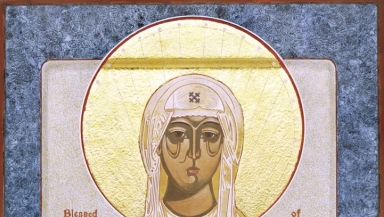
Sheila Upjohn has loved the writings of Julian of Norwich ever since she stumbled upon this medieval mystic by accident back in the 70s.
Such is the impression they made on her that she's written a book on the subject, The Way of Julian of Norwich, in the hopes that more people will read her.
Sheila speaks to Christian Today about Julian's writings and why she believes they are a must-read for anyone struggling to understand the nature of God.
CT: What's the fascination for you with Julian?
Sheila: She turned everything I thought about God on its head. I always thought that I had to earn love and that God couldn't love me unless I was good. Otherwise God would be cross. And try as I would, I was never going to be good enough. But Julian taught me that we are His heavenly treasure and He wants to make us His partners in good deeds.
Suddenly I realised that God hadn't created me to kick me around and make me miserable, but because He loved me and wanted to help me the whole time.
Even when I fall flat on my face, He wants to pick me up again and say 'come on, love'. And it has nothing to do with my being good but because He is a totally forgiving, loving God.
CT: A lot of Christians struggle with those kinds of thoughts about God, even after many years.
Sheila: Yes they do, but it's that simple - it's that God loves us, and that was Julian's message. She wasn't clever, she wasn't an intellectual, but she loved God. And she knew that God doesn't want to beat us down, but He wants to make us His partner in good deeds.
Even when it comes to prayer, He is asking for our prayers because our prayers make Him glad and happy. Just like parents want their children to Skype them, God actually wants us to talk to Him - He's waiting for our call! And when you call on Him, you won't get one of those voice messages that says 'your call is important to us' but then leaves you hanging for three weeks. He'll be there and listen.
CT: How did you encounter Julian?
Sheila: I stumbled upon her by mistake when I got put on a prayer committee by the Dean of Norwich back in the 70s and they were looking at Julian at the time. I walked into this room full of priests, monks and nuns and said in a very loud voice 'I don't know why I'm on this committee because the only thing I know about St Julian is his name!'. And a couple of nuns took me very kindly into a corner and said 'not the saint' and the other said 'not a man'. And so I shut up!
But you see, back then in the 70s, everything was changing in the Church of England. The Thees and Thous were being dropped to make the Church up-to-date and relevant, and at the time I thought: here we are digging out some dreary old medieval woman who spent all her life in one room. I thought, they've got to be out of their minds! But I went away and read her book and discovered this amazing woman.
CT: The visions are extraordinary because she prayed to God to become ill, which seems a bit odd today!
Sheila: It does seem very weird indeed! But she wanted to experience what it would be like to leave everything behind, as if she was dying and nothing else mattered, which does seem odd to us today. But she also prayed to know what it was like to be present at the Crucifixion. It wasn't for the shock horror value but because she loved Christ and wanted to be with him while he was suffering.
One way to think of it is like when somebody's ill you just want to sit with them and hold their hand, or when something terrible has happened to someone and there's nothing you can say, you just want to be there. Like that, she just wanted to be there at the Crucifixion. And as a result of that desire, all these things happened.
The extraordinary thing is that after seeing all the horror of it and thinking she was going to see him actually dead, she describes how at that very moment his expression changed to joy. And he said, are you well pleased that I suffered for you? If I could have suffered more, I would have suffered more.
He could have made Heaven or Earth without toil or trouble but he was ready to suffer more for us. It's extraordinary how he was so filled with joy because of his love for us.
CT: In our day and age we are more averse to suffering and want to avoid it, but Julian didn't seem to be afraid of it.
Shelia: No, she wasn't. We certainly don't want to suffer, but the other thing is that we don't want to fail and, interestingly, Julian says that failing is good for us, because if we never failed, we would never know the wonderful love of our maker, and never know how poor and weak we are on our own.
It's a similar story with our sin, which she says will be shown not as shame but as glory, which takes a lot of getting your head round! But God showed her David from the Old Testament, and Peter and Thomas from the New Testament, to point to His mercy. They failed but they all realised that it is God who picks us up and is not angry.
CT: What did the Church at the time think of Julian?
Sheila: In her day, her book was handed around secretly between friends and it was smuggled out of England when the Catholics were kicked out at the Reformation. It wasn't actually published in England until 1660 and that time it was dismissed by one chap as ravings.
But she writes so simply because as far as we know she didn't have an education at all. Certainly there were very few books written in English at the time and she just wrote as she spoke, so it's all speech rhythm. She's just writing it down to tell people how it happened and that's why she's so readable.
CT: She was a holy woman, living and praying in self-imposed isolation. How unusual was that at the time?
Sheila: She was known in Norwich at that time. In fact, there were about 23 anchoresses like her so it was quite a usual thing. She wasn't known to be a writer but she was known as one of many holy women sitting by a church praying. People would come and see her, and talk to her, like Margery Kempe, who had the gift of tears.
CT: It seems like a stark contrast to us in lockdown today that she willingly isolated herself?
Sheila: Yes and there must have been something to it because she didn't go crazy! And I think that's because she talked to God, and if only we talked to God a bit more in our isolation we wouldn't be so out of our minds! Talking to God in this way gets you through reality.
CT: What else do you think we can learn from the life of Julian today?
Sheila: There's no time for silence and solitude these days. Silence and solitude are wonderful, yet we avoid them and fill them up with stuff. People instinctively grab their phones to see what's happening on Facebook, but silence and solitude are really necessary for people and we don't get enough of them. We're terribly well fed with our diets and vitamins, but our mental solitude is dreadful. We're frightened of it. When lockdown started, people were busy trying out all sorts of things like knitting! It was like we didn't know how to just sit and be. But Julian shows us how important and beneficial this is for us, and how much we need it.













